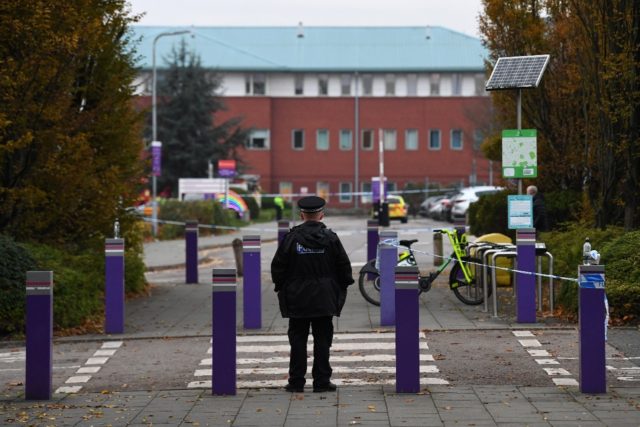British police are investigating the background of a mentally troubled Iraqi-Syrian convert to Christianity who died in a botched bomb attack in Liverpool, according to multiple reports on Tuesday.
Counter-terrorism police in northwest England released four men late Monday after questioning them over the incident, which came seconds before Britain marked Remembrance Sunday.
“Police have been satisfied with their account and they have been released,” security minister Damian Hinds told ITV News.
Emad Al Swealmeen, 32, has been named by police as the would-be bomber whose crude improvised device went off in the back of a taxi outside a Liverpool hospital.
He was killed in the fireball, while the quick-thinking taxi driver escaped with minor injuries after reportedly locking Al Swealmeen inside his cab.
Investigators are probing whether the main charge on the device failed to explode, given none of the nearby vehicles at the scene was damaged, the BBC reported Tuesday.
Police have given few other details about the Liverpool suspect, while ministers have said they cannot comment on his background due to the ongoing investigation.
Junior interior minister Kit Malthouse told MPs that the incident “is yet to be understood” but served as a “stark reminder about the threat we all face from terrorism”.
The government increased its threat assessment to “severe” — the second-highest level, meaning a terrorist attack is highly likely — following the second incident in a month, after Conservative MP David Amess was stabbed to death.
‘Quiet fellow’
Reports by newspapers and broadcasters, quoting unidentified security sources, said Al Swealmeen was a failed asylum seeker of Iraqi and Syrian descent with a history of mental-health problems.
He was taken in by Elizabeth and Malcolm Hitchcott, a Christian volunteer couple in Liverpool, for eight months from 2017 as his appeal for refugee status played out.
Elizabeth Hitchcott told the BBC she felt “just so sad” and “very shocked” by Sunday’s incident, adding: “We just loved him, he was a lovely guy.”
Malcolm Hitchcott told ITV News that Al Swealmeen spent time in a mental institution after being arrested with a knife in an incident in central Liverpool.
But otherwise “he was a very quiet fellow” who converted to Christianity and was baptised in Liverpool Cathedral, having rejected Islam, he added.
The same cathedral was the venue of Liverpool’s Remembrance Sunday service attended by some 2,000 people to honour Britain’s military veterans and war dead.
The Times newspaper reported an “Islamist plot was a significant line of inquiry” for investigators, pointing to the cathedral or Liverpool Women’s Hospital as possible targets.
It said the improvised device contained TATP, the same explosive favoured by the Islamic State group that was used in the 2015 Paris attacks and the Manchester Arena bombing in 2017.
Russ Jackson, in charge of counter-terrorism policing in the region, said late Monday officers now have “a much greater understanding” of the device and how it was likely to have been assembled.
But he warned it could be “many weeks” until police fully understand the incident.
‘Bravery’
The blast and fireball sent thick smoke into the air outside the Liverpool hospital as Britain was about to fall silent in tribute to its armed forces.
There was widespread praise for the “heroic” taxi driver, named locally as David Perry, following reports he locked Al Swealmeen inside the cab after growing suspicious about his intentions.
Perry was treated in hospital but released Monday, according to his wife, who posted on Facebook that it was “an utter miracle” that he survived.
Prime Minister Boris Johnson, who called a meeting of a government emergency body Monday, said it appeared the driver had behaved “with incredible presence of mind and bravery”.
His spokesman on Tuesday declined to discuss specifics of the case.
But he said the government wanted to speed up the removal of those with no right to be in the UK and streamline the appeals and judicial process, “which can be used to frustrate removal”.
“This is one part of the UK’s new plan for immigration and it remains the only credible plan to fix our broken asylum system,” the spokesman added.

COMMENTS
Please let us know if you're having issues with commenting.